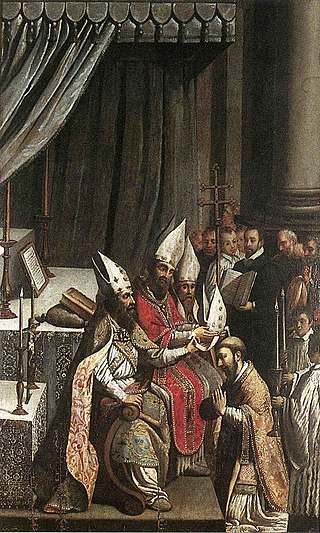
Apostolic succession is the method whereby the ministry of the Christian Church is considered by some Christian denominations to be derived from the apostles by a continuous succession, which has usually been associated with a claim that the succession is through a series of bishops. Those of the Catholic, Eastern Orthodox, Scandinavian Lutheran, Anglican, Oriental Orthodox, Church of the East, Hussite, Moravian and Old Catholic traditions maintain that "a bishop cannot have regular or valid orders unless he has been consecrated in this apostolic succession". These traditions do not always consider the episcopal consecrations of all of the other traditions as valid.

An episcopal polity is a hierarchical form of church governance in which the chief local authorities are called bishops. The word "bishop" here is derived via the British Latin and Vulgar Latin term *ebiscopus/*biscopus, from the Ancient Greek ἐπίσκοπος epískopos meaning "overseer". It is the structure used by many of the major Christian Churches and denominations, such as the Catholic, Eastern Orthodox, Oriental Orthodox, Church of the East, Anabaptist, Lutheran, and Anglican churches or denominations, and other churches founded independently from these lineages. Many Methodist denominations have a form of episcopal polity known as connexionalism.

Ecumenism – also called interdenominationalism, or ecumenicalism – is the concept and principle that Christians who belong to different Christian denominations should work together to develop closer relationships among their churches and promote Christian unity. The adjective ecumenical is thus applied to any non-denominational initiative that encourages greater cooperation and union among Christian denominations and churches.
The Continuing Anglican movement, also known as the Anglican Continuum, encompasses a number of Christian churches, principally based in North America, that have an Anglican identity and tradition but are not part of the Anglican Communion.
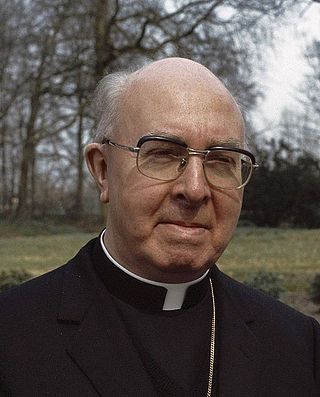
Johannes Gerardus Maria Willebrands was a Dutch Cardinal of the Roman Catholic Church. He served as President of the Pontifical Council for Promoting Christian Unity from 1969 to 1989, and Archbishop of Utrecht from 1975 to 1983. Elevated to the cardinalate in 1969, Willebrands was central to the increased ecumenism of the Church in the second half of the 20th century, and was considered papabile at the two conclaves held in 1978.
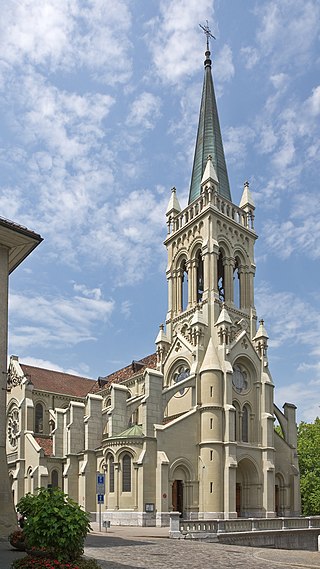
The Christian Catholic Church of Switzerland is an Old Catholic denomination in Switzerland. This denomination is part of the Union of Utrecht.
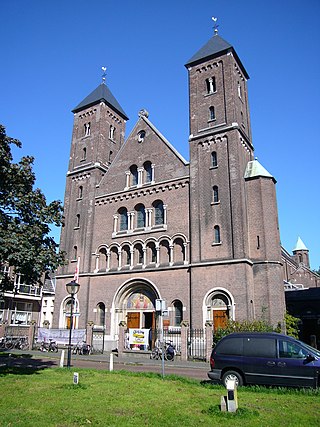
The Union of Utrecht of the Old Catholic Churches, most commonly referred to by the short form Union of Utrecht (UU), is a federation of Old Catholic Churches, nationally organized from schisms which rejected Roman Catholic doctrines of the First Vatican Council in 1870; its member churches are not in communion with the Roman Catholic Church.
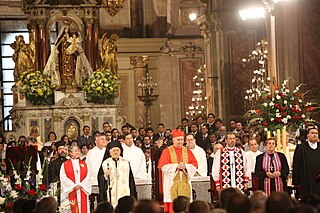
The Catholic Church has engaged in the modern ecumenical movement especially since the Second Vatican Council (1962–1965) and the issuing of the decree Unitatis redintegratio and the declaration Dignitatis humanae. It was at the Council that the Pontifical Council for Promoting Christian Unity was created. Those outside of the Catholic Church were categorised as heretics or schismatics, but in many contexts today, to avoid offence, the euphemism "separated brethren" is used.
The September 14–16, 1977 Congress of St. Louis was an international gathering of nearly 2,000 Anglicans in St. Louis, Missouri, united in their rejection of theological changes introduced by the Anglican Church of Canada and by the Episcopal Church in the United States of America in its General Convention of 1976. Anglicans who attended this congress felt that these changes amounted to foundational alterations in the American and Canadian provinces of the Anglican Communion and meant that they had "departed from Christ's One, Holy, Catholic and Apostolic Church." Theological liberalism, financial support for political action groups, participation in the Consultation on Church Union (COCU), revisions to the Book of Common Prayer, and the ordination of women priests were not the only reasons for the split, but they were seen by these churches as evidence of the mainline church's departure from Anglican orthodoxy. The idea for a congress originated with the Reverend Canon Albert J. duBois in 1973 in preparation for the Louisville General Convention of the Episcopal Church. Canon duBois and the group called "Anglicans United" toured parishes in advance of the Congress to garner support. This congress was sponsored by the Fellowship of Concerned Churchmen, an organization founded in 1973 as a coordinating agent for laypeople and clergy concerned about the breakdown of faith and order within the Episcopal Church and the Anglican Church of Canada.
The historic or historical episcopate comprises all episcopates, that is, it is the collective body of all the bishops of a group who are in valid apostolic succession. This succession is transmitted from each bishop to their successors by the rite of Holy Orders. It is sometimes subject of episcopal genealogy.
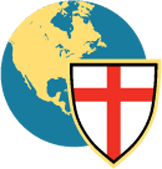
The Anglican Church in North America (ACNA) is a Christian denomination in the Anglican tradition in the United States and Canada. It also includes ten congregations in Mexico, two mission churches in Guatemala, and a missionary diocese in Cuba. Headquartered in Ambridge, Pennsylvania, the church reported 977 congregations and 124,999 members in 2022. The first archbishop of the ACNA was Robert Duncan, who was succeeded by Foley Beach in 2014.
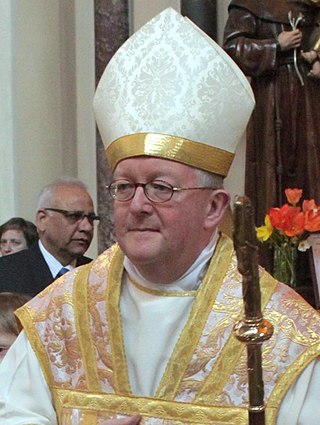
Bernard Longley is an English prelate of the Roman Catholic Church. He was named the Archbishop of Birmingham on 1 October 2009, and installed on 8 December 2009.
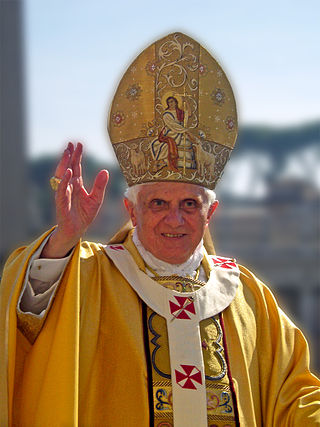
Pope Benedict XVI, who led the Roman Catholic Church as Pope from 2005 to 2013, continued manouevring the Church through the dynamics of modernity, which the Church had begun engaging in with the Second Vatican Council. Because the question of religious pluralism is a key issue raised by modernity, ecumenism, the establishment of harmony and dialogue between the different Christian denominations, is a significant concern of a post Second Vatican Council Church. Pope Benedict XVI's approach has been characterised as leaning toward the conservative while still being expansive and engaged, involving the full breadth of Christendom, including the Orthodox Churches and Protestant churches, as well as freshly engaging with other Christian bodies considered by Roman Catholics to be more heterodox, such as the Church of Jesus Christ of Latter-day Saints.
Anglican–Roman Catholic dialogue is the historical communication between the Anglican Communion and the Roman Catholic Church, through their ecumenical relations. These were notably shaped subsequent to the Second Vatican Council (1962–1965).
A personal ordinariate for former Anglicans, shortened as personal ordinariate or Anglican ordinariate, is a canonical structure within the Catholic Church established in order to enable "groups of Anglicans" and Methodists to join the Catholic Church while preserving elements of their liturgical and spiritual patrimony.
The Ecumenical Catholic Communion (ECC) is an Independent Catholic church based within the United States. Its members understand themselves as following the Catholic tradition without being in communion with the Bishop of Rome. The ECC is a confederation of independent communities based in the United States and Europe. The membership of the ECC is about 10,000, including seven bishops, and more than 50 communities across 20 states. In 2009, the Ecumenical Anglican Church (EAC), an independent church, joined the ECC. The ECC is a member of the National Council of Churches (NCC).

Gerhard Ludwig Müller is a German cardinal of the Catholic Church. He served as the Cardinal-Prefect of the Congregation for the Doctrine of the Faith (CDF) from his appointment by Pope Benedict XVI in 2012 until 2017. Pope Francis elevated him to the rank of cardinal in 2014.
Paul David Loup Avis is an English Anglican priest, theologian, and ecumenist. He was General Secretary of the Church of England's Council for Christian Unity from 1998 to 2011, theological consultant to the Anglican Communion Office, London, from 2011 to 2012, and Canon Theologian of Exeter Cathedral from 2008 to 2013. He was honorary professor in the Department of Theology and Religion at Durham University 2017–2021 and is currently Honorary Professor in the School of Divinity, University of Edinburgh (2022-). At the University of Exeter he was visiting professor of theology from 2009 to 2017 and subsequently honorary research fellow until 2021. He is the editor of the series Anglican-Episcopal Theology and History, also published by Brill. Avis was also a chaplain to Queen Elizabeth II, 2008–2017.

John Wilson is an English prelate of the Catholic Church, the Metropolitan Archbishop of Southwark. He had previously served as an auxiliary bishop in the Archdiocese of Westminster (2016–2019).











